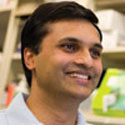Advisory Board and Editors Molecular Biology

Alessandra Montecucco
Alessandra Montecucco heads a laboratory of the Unit of Molecular and Cellular Biology of the Nucleus at the Institute of Molecular Genetics (IGM) of the Italian National Research Council (CNR). Her research activity is focused on the cellular response to DNA damage and genome integrity.

Héctor Manuel Mora-Montes
In 2010, I established the Laboratory of Fungal Glycobiology at Universidad de Guanajuato, Mexico, with the main goal to understand the synthesis mechanisms of the fungal cell wall and the interaction of medically relevant fungal pathogens with the host. This laboratory is characterized by its facilities to perform chemical, immunological, genetic, molecular, and cellular analyses of human fungal pathogens. Therefore, it is among a handful of research facilities within Mexico and Latin America offering a multidisciplinary and integral approach to understand the host-fungus interaction. Our group has a solid international reputation in the molecular and immunological studies of organisms belonging to the genus Candida and Sporothrix.

Joanna Moraczewska
Professor at Kazimierz Wielki University in Bydogszcz, Faculty of Biological Sciences, Poland. Head of the Department of Biochemistry and Cell Biology. Our research concentrates on molecular mechanisms of actin filament regulation in muscle and non-muscle cells.

Paula I. Moreira
Paula I. Moreira is Assistant Professor at the Faculty of Medicine and Principal Investigator at the Center for Neuroscience and Cell Biology, University of Coimbra. Moreira published more than 100 scientific peer-reviewed articles and she is on the editorial board of over 10 journals. Paula Moreira won the Stimulus to Research prize, in 2003, supported by the Calouste Gulbenkian Foundation and, the L’Oreal for Women in Science, in 2008, supported by L'Oreal Portugal/UNESCO/ FCT.

Daniel C Moreira
My research interests lie in the area of redox processes in biology and medicine. My main line of work investigates the role and underlying mechanisms of redox metabolism (i.e., reactive species and endogenous antioxidants) in animals during the depression of metabolic rate induced by environmental stresses, including projects that examine the modulation of antioxidant systems in animals exposed to oxygen deprivation and during other situations of metabolic depression. More recently and concurrently, I am also involved in the prospection of bioactive natural compounds (e.g., peptides from amphibians, plant extracts and phytochemicals) for health applications, with emphasis on antioxidant molecules.

Boyd A Mori
Assistant Professor of Agricultural and Ecological Entomology in the Department of Agricultural, Food and Nutritional Science, University of Alberta.
Research in our lab focuses on varying aspects of insects in agricultural systems. Our focal areas of research include chemical ecology, population genetics, and insect-plant interactions. We use a variety of techniques from field and laboratory bioassays to transcriptomics and genomics to examine basic and applied ecological questions.

Karen L. Mossman
Professor of Pathology and Molecular Medicine and member of the Institute of Infectious Disease Research and McMaster Immunology Research Centre at McMaster University. Associate Editor of PLOS Pathogens and PLOS ONE and Editorial Board Member of Journal of Virology. Recipient of the 2006 Christina Fleischmann Award from the International Society for Interferon and Cytokine Research.

Kirankumar S. Mysore
Professor of Plant Biology at the Samuel Roberts Noble Foundation, Ardmore, OK, USA. Adjunct professor at the Department of Entomology and Plant Pathology, Oklahoma State University, Stillwater, OK.

Sushma Naithani
Sushma Naithani is an Associate Professor Senior Research in the Department of Botany and Plant Pathology at Oregon State University, USA. The current focus of her research is on understanding information flow in living systems and how evolution shapes this flow using systems-level pathway modeling supported by high-quality biocuration, gene-orthology-based predictions, and analysis of omics data. She serves as a senior curator for the Plant Reactome knowledgebase. Sushma has authored 31 peer-reviewed refereed research articles in high-impact journals, including Nature, Nature Biotech, PNAS, etc. One of her research papers has been selected by the 'Faculty of 1000 Biology'. In addition, she has authored six book chapters and one Open Textbook (S. Naithani (2021): History and Science of Cultivated Plants published by Oregon State University Open Educational Resources, EBOOK ISBN: 978-1-955101-08-0, available at https://open.oregonstate.education/cultivatedplants). She is also an Associate Editor for Frontiers in Plant Science-Plant Biotechnology and served as the Editor-in-chief of the Current Plant Biology (2017-2023).

Helder Nakaya
Prof. Helder Nakaya is Deputy Director of School of Pharmaceutical Sciences at University of São Paulo, Brazil, Associate Professor at University of São Paulo, Brazil, and Adjunct Professor of the School of Medicine, Emory University, USA. He has a PhD in Molecular Biology with extensive training in Bioinformatics. He is an expert in Systems Vaccinology, an interdisciplinary field that combines systems-wide measurements, networks, and predictive modelling in the context of vaccines and infectious disease. Dr. Nakaya has developed systems biology approaches to understand and predict the mechanisms of vaccine induced-immunity for Yellow Fever, seasonal Influenza, Meningococcal, and Tularemia vaccines. His lab is focused on investigating the basis of infectious diseases using computational systems biology.

Felipe G Naveca
I am a microbiologist with experience in classical and molecular techniques applied to the study of human pathogens, mainly threatening RNA and DNA viruses. My research focuses on developing diagnostic tools, molecular epidemiology, and evolution, mostly on emergent and reemergent viruses. My team approaches include genomics and phylogenetic studies to characterize known and unknown viruses; field studies on arboviral emergence in a rural area in the Brazilian Amazon; immunogenetics studies related to susceptibility or resistance against microbial infections; studies on biomarkers of acute viral illness; in vitro & in vivo virus-host interactions and evolution; and SARS-CoV-2 and other respiratory viruses molecular epidemiology. Senior investigator of Fiocruz Amazonas and Deputy Director of Research and Innovation. Member of the Brazilian Society for virology since 1997. Member of the Brazilian network of specialists in Zika and correlated diseases.

Irene L.G. Newton
Assistant Professor of Biology in the Microbiology section. Woodrow Wilson Foundation Fellow, Andrew Mellon fellow, and advisor to the Social Science Research Counsel, former Howard Hughes Medical Institute Predoctoral Fellow and former NSF postdoctoral fellow.

